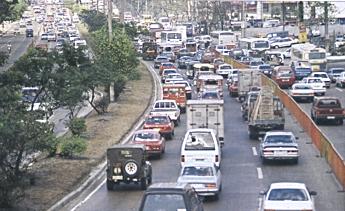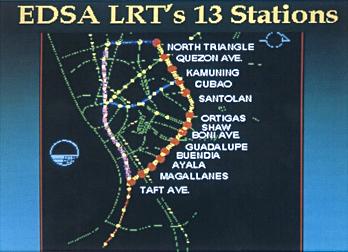LIBERALIZATION AND PRIVATIZATION OF UTILITIES AND SERVICES
One of the main reasons for the take-off of Philippine economy in the last two years was the ready availability of power supply, telecommunication facilities, transport network, and shipping facilities. And this was made possible by the strong participati
on of the private sector.
- Four years ago, power shortages were common occurrence in Metro Manila. Many business establishments, such as restaurants, factories, retail stores, etc., faced financial ruins. The government solved the crisis by calling in independent power producer
s (IPPs). Today, these IPPs generate the required power from 26 separate plants. Private investments will also come in a little later to meet the capacity needs for the next 10 years, making the crippling brownouts already a thing of the past.
- Two years ago, the government broke the telecom monopoly, controlled by the Philippine Long Distance Telephone Co., by awarding 11 different franchises to eight different carriers. The immediate effects of this liberalization have been good, particula
rly for some consumers. Multinational companies and other big users of long distance calls get special package rates; also, applications for new lines are being processed more quickly; and customer complaints are swiftly acted upon.
- It is in the transport business that private sector investments - using the BOT principle - are badly needed, because traffic in Metro Manila, is becoming a very serious problem. Already, a consortium of private companies and individual investors the
Metro Rail Transit Corp. (MRTC) has started work on the second light rail project, which will stretch from Quezon City in the north and connect with LRT-1 in Pasay City. This new line is expected to open in 1998, ease the traffic at EDSA, and reduce the
pollution levels by as much as 50%. The group has also been requested to take over the problem-riddled LRT - 1. In addition, there are six BOT-type projects to build and upgrade arterial roads around Metro Manila.


- The Philippines' shipping industry has always been controlled by the government to ensure that goods move freely and cheaply. Moreover, strict price capping has discouraged the private sector to come in. Recently, however, the government has deregulat
ed the industry. For instance, it has removed the umbrella price restrictions and set up categories of goods. Thus, shipping lines can now charge competitive rates for luxury items but must carry rice and other staple foods at set prices. Also, they can n
ow increase their fares if the price of fuel rises, without applying anymore with the marine board.
"Source: ASIAMONEY magazine
March 1996 Supplement - The Philippines Back in the Spotlight"
(C)Copyright 1996 Euromoney Publications (Jersey) Ltd."
"Materials used with permission."
For more information, e-mail to
asiamony@i-manila.com.ph

Back to Kalakalan
[ The Philippines | The President | Philippine Economy |
Finance Secretary | Liberalization |
Economic Growth | Booming Philippine | GSIS | Economy ]




